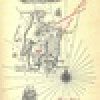This is an exciting project aimed at developing a theoretical and experimental framework for externalising and mapping imaginary and fictional places, specifically places
that exist in literary texts and poems. This research is highly innovative as it brings together experimental methods and techniques in cognitive science, along with research in human geography and environmental psychology, to further our understanding of the way we interact with fictional places, both real and imagined. We are looking at ways to externalise the cognitive maps that we may form of such places, and ground them in real-world information.
We are interested in questions such as:
- How do readers map literary spaces when there is a map present (e.g. Treasure Island; Lord of the Rings) or when there is not?
- What is the difference between mental mapping of prose and poetic spaces?
- What form of representation is appropriate for such fictional spaces?
To address these, we carry out user experiments applying a range of knowledge extraction methods and using a variety of texts as test cases.
(Funded by Faculty Research Grant, Lancaster University)

